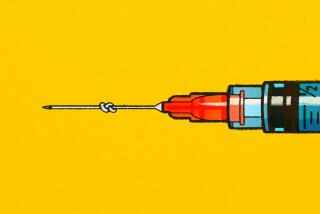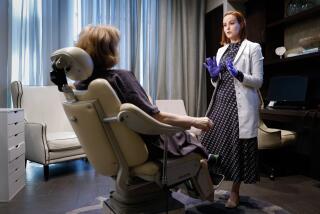Cosmetic Surgery Trend Changes the Face of Japan
- Share via
TOKYO — Risa Arato never liked her hooded eyes -- even her friends said she had a perpetually stony gaze. And she hated the way her sunglasses slipped down her nose. But the clincher was meeting her estranged father for the first time since childhood and being told she hadn’t turned out very cute.
So the 19-year-old saleswoman decided to remake her face -- and to do it on “Beauty Colosseum,” a prime-time Japanese TV show in which people get free makeovers on camera from a panel of “beauty experts” including a cosmetic surgeon.
“I used to be afraid to show my face in public -- I was a real indoor person,” said Arato. “Now I can look people in the eye.”
Facing less social stigma and encouraged by new no-scalpel procedures, women are more than ever changing the face of Japan by walking into cosmetic surgery clinics and walking out with rounder eyes, bigger noses and fewer wrinkles.
“Cosmetic surgery used to have a shadowy reputation,” said plastic surgeon Toshiya Handa. “It was the kind of thing you only heard about celebrities and bar hostesses doing.”
When he isn’t redesigning faces on “Beauty Colosseum,” Handa is the assistant director of the Otsuka Academy of Cosmetic and Plastic Surgery, one of Japan’s best-known cosmetic surgery chains, with 14 clinics around the country.
The nation’s decade-long economic slump has hardly put a blemish on the business. By one credit agency’s reckoning, spending on cosmetic surgery climbed to around $25 million last year, up 50% from 1994.
Cosmetic surgeons say insecurities about typically Asian looks can be partially explained by Japan’s long infatuation with images of the West -- Arato said she idolizes Julia Roberts -- though most of the clinic’s testimonials simply describe anxiety about looking plain.
What has changed is the stigma about getting surgery.
Conventional wisdom once held that altering the face inherited from your parents was disrespectful or just vain. But Arato, who had surgical enhancements to her eyes, nose and chin, said her folks supported her decision.
Nowadays students, working women and housewives are picking out new body parts from Otsuka’s glossy 111-page catalog.
Handa credits a trend toward a more assertive brand of femininity that has even made jet-black hair a rare sight on Japanese streets as more women go in for dye and tints.
“These women want to make the parts of their face stand out,” he said. “This is about self-expression.”
Still, something of the stigma remains, judging by how many of the women who appear on “Beauty Colosseum” and in myriad magazine testimonials do so under assumed names. Risa Arato, for instance, appeared on TV under the name Saori Toda.
Attitudes toward cosmetic surgery have also been dramatically reshaped by a new generation of cheaper, noninvasive techniques that aren’t permanent.
Doctors can create double eyelids with sutures in 10 minutes for as little as $400. Other in-demand procedures include injections of botulium toxin A -- a wrinkle-buster popular in the United States -- and hyaluronic acid, a tissue-filler from Europe used to enlarge noses and chins.
The treatments last for months before the substances are absorbed by the body, and doctors say there’s less risk of allergic reaction than with older injectables like collagen.
“It’s a low-risk, low-return formula that appeals to a conservative Japanese mentality,” said Dr. Katsuya Takasu, who runs a national chain of clinics and is a regular on another TV show. “The worst that can happen is you go back to your old face.”
As television and women’s magazines pitch the glamorous possibilities of cosmetic surgery into millions of Japanese homes, concern has risen about the risks.
That danger was recently highlighted when police started investigating a Tokyo clinic because a 54-year-old woman died after liposuction. Others worry about damage to Japan’s psyche, saying “Beauty Colosseum” is turning the complexes of individuals into a national obsession.
But there’s little sign of soul-searching among younger Japanese.
Rina Hayashi, a 29-year-old housewife, got wider eyes because she thought it would make eye shadow easier to apply.
“It didn’t change my life or anything,” Hayashi said. “But once you do it, you think of plenty of other things about yourself you’d love to tweak.”
More to Read
Sign up for Essential California
The most important California stories and recommendations in your inbox every morning.
You may occasionally receive promotional content from the Los Angeles Times.










